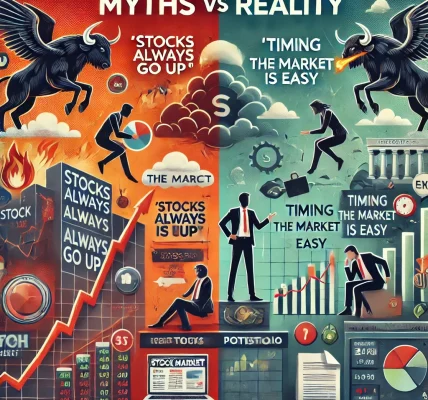In recent years, Environmental, Social, and Governance (ESG) investing has become a major force in global financial markets. Investors are increasingly looking beyond just profits and are considering companies’ sustainability, ethical practices, and governance structures before making investment decisions.
But why is ESG investing gaining momentum, and how does it impact stock prices? Let’s explore this growing trend and its implications for investors.
Table of Contents
✅ What is ESG Investing?
✅ Why is ESG Investing Gaining Momentum?
✅ How ESG Factors Affect Stock Prices
✅ The Role of Regulatory Policies in ESG Growth
✅ Challenges and Risks in ESG Investing
✅ Future Outlook: Will ESG Continue to Grow?
✅ How to Start Investing in ESG Stocks?
What is ESG Investing?
ESG investing focuses on companies that meet certain Environmental, Social, and Governance standards.
📌 Environmental (E): Focuses on how companies handle climate change, carbon emissions, renewable energy, and resource conservation.
📌 Social (S): Examines labor practices, diversity, customer satisfaction, and community relations.
📌 Governance (G): Looks at corporate leadership, executive compensation, board diversity, and ethical business practices.
🔹 Example: Tesla is a popular ESG stock due to its commitment to clean energy and sustainability.
Why is ESG Investing Gaining Momentum?
1️⃣ Growing Investor Demand for Ethical Investments
Investors, particularly Millennials and Gen Z, prefer companies that align with their values and social responsibility.
📌 A 2022 survey by Morningstar found that over 70% of young investors consider ESG factors before investing.
2️⃣ Regulatory and Government Support
Governments worldwide are introducing ESG-related policies, such as:
✅ The EU Green Deal, which promotes sustainable finance.
✅ The SEC’s ESG disclosure requirements in the U.S.
✅ India and China implementing corporate sustainability reporting.
3️⃣ Corporate Shift Toward Sustainability
Companies are adopting ESG principles to attract investors and customers. Many businesses now publish sustainability reports to showcase their commitment.
4️⃣ ESG Funds Are Outperforming Traditional Funds
Many ESG-focused funds have shown strong returns, making them attractive to institutional investors.
📌 Example: The S&P 500 ESG Index has outperformed the traditional S&P 500 in multiple periods.
5️⃣ Rising Climate and Social Awareness
With issues like climate change, racial equality, and corporate accountability in focus, ESG investing has gained more traction.
📌 Example: BlackRock, the world’s largest asset manager, now prioritizes ESG investments and urges companies to adopt sustainable practices.
How ESG Factors Affect Stock Prices
ESG investing directly impacts stock prices in several ways:
1️⃣ Positive ESG Ratings Attract Institutional Investors
Institutional investors prefer companies with high ESG scores, leading to higher demand and increased stock prices.
2️⃣ Lower Risk Leads to More Stability
Companies with strong ESG policies tend to have fewer regulatory fines, lawsuits, and scandals, making them more stable investments.
📌 Example: Companies with poor environmental policies (e.g., BP’s oil spill) faced huge stock price declines and legal penalties.
3️⃣ Increased Consumer Preference for ESG Brands
Consumers prefer brands that align with ethical and sustainable values, boosting revenue and, in turn, stock prices.
📌 Example: Patagonia and Tesla gained massive brand loyalty due to their ESG commitments.
4️⃣ Government Incentives and Tax Benefits
Companies focusing on ESG receive government subsidies, tax breaks, and incentives, making them more attractive to investors.
📌 Example: Renewable energy companies receive federal tax credits in the U.S., increasing their profitability.
The Role of Regulatory Policies in ESG Growth
🌍 Global ESG Regulations
Governments worldwide are mandating ESG disclosures to ensure corporate accountability.
📌 Example: The European Union (EU) requires companies to report ESG data under the Corporate Sustainability Reporting Directive (CSRD).
📜 U.S. ESG Policies
The SEC (Securities and Exchange Commission) has proposed stricter ESG disclosure rules to prevent “greenwashing” (false ESG claims).
📌 Example: In 2023, the SEC fined a major investment firm for misleading ESG claims.
🇨🇳 China’s ESG Push
China is heavily investing in green energy and enforcing strict ESG regulations to attract foreign investors.
Challenges and Risks in ESG Investing
While ESG investing has many benefits, it also has challenges:
1️⃣ Lack of Standardized ESG Metrics
Different rating agencies use different ESG scoring systems, creating inconsistency.
📌 Example: Tesla was removed from the S&P 500 ESG Index despite being a leader in clean energy due to governance issues.
2️⃣ Greenwashing (Misleading ESG Claims)
Some companies exaggerate their ESG efforts to attract investors.
📌 Example: Volkswagen was caught in a scandal for falsely claiming its cars had low emissions.
3️⃣ Performance Concerns
Some investors worry that focusing too much on ESG factors could reduce profitability.
📌 Example: Oil and gas stocks have outperformed many ESG stocks in recent years due to high energy demand.
Future Outlook: Will ESG Continue to Grow?
ESG investing is expected to continue growing due to:
✔ Stronger government policies enforcing ESG compliance.
✔ Increased investor demand for sustainable investments.
✔ Advancements in ESG data analysis for better transparency.
✔ Corporations prioritizing ESG to attract talent and investors.
📌 A Bloomberg report estimates that ESG assets will reach $50 trillion by 2025, making up one-third of global investments.
How to Start Investing in ESG Stocks?
If you want to invest in ESG-friendly stocks, follow these steps:
✅ 1. Research ESG Ratings
Use platforms like MSCI ESG Ratings, Sustainalytics, or Bloomberg ESG Index to check company scores.
✅ 2. Invest in ESG ETFs or Funds
Some popular ESG funds include:
📌 Vanguard ESG U.S. Stock ETF (ESGV)
📌 iShares ESG Aware MSCI USA ETF (ESGU)
📌 SPDR S&P 500 ESG ETF (EFIV)
✅ 3. Analyze Companies’ Sustainability Reports
Check if a company genuinely follows ESG principles or is just marketing ESG for branding.
✅ 4. Diversify Your Portfolio
Invest in different ESG sectors like renewable energy, electric vehicles, sustainable agriculture, and ethical finance.
Final Thoughts: ESG Investing is the Future
ESG investing is not just a trend—it is becoming a core part of financial markets. Investors who focus on sustainable, ethical, and governance-driven companies are likely to see long-term growth and stability.
💡 Key Takeaways:
✔ ESG investing is gaining popularity due to government regulations and investor demand.
✔ Companies with strong ESG practices attract more investors and have better financial stability.
✔ ESG investing affects stock prices by increasing demand, reducing risks, and improving brand loyalty.
✔ Despite challenges like greenwashing and inconsistent metrics, ESG remains a powerful investment strategy.




